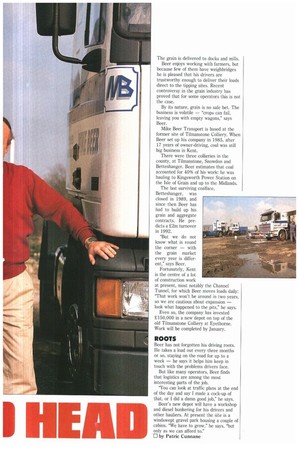PROFILE
Page 42

Page 43

If you've noticed an error in this article please click here to report it so we can fix it.
MIKE BEER
• Dover-based Mike Beer Transport is a specialist haulier — it runs bulk grain tippers to the Continent and returns with loads of milling wheat.
"We have at least five tippers a week going into Europe," says owner Mike Beer, who is one of the few companies to export bulk grain by tipper. Following last year's changes to EC cabotage permits the firm can pick up loads anywhere in the EC and deliver to other Community countries before returning to the UK.
"We pick up loads in Spain and deliver them to Italy — the vehicles often have enough work to go away at the weekend and stay away all week," says Beer.
As most of the loads are perishable timing is crucial; delays at ferry crossings are a major headache.
"You have to keep a lot of times and distances in your head," says Paul Woodward, Mike Beer Transport's continental controller. He keeps a close eye on drivers' locations so that loads can be swapped round if a truck is delayed.
It was a breakdown in France that led Beer to replace his four Volvo Fl Os with five Leyland Daf 95 Series tractive units. The Volvos had been suffering from braking problems, "We had to reline the vehicles every three months," says Beer, although he admits Volvo disputes this point.
Beer was impressed with the local Leyland Daf dealer's speed in getting hold of a spare differential for a Roadtrain stranded in Lille.
"When I contacted the dealer, Channel Commercials, it arranged for the part to be sent overnight from Lancashire to its Ashford depot," explains Beer. "It arrived in the early hours of the morning, I was telephoned by Channel, picked up the axle and went straight to Lille — it was excellent service."
Beer is also impressed by the 95's three-year warranty, large sleeper cab and powerful engine.
HARVEST
Mike Beer Transport's 10-vehicle fleet now comprises the five 95s, two Roadtrains and three Scanias. It employs 14 owner-drivers who work all year round. In the peak harvest season the company can have up to 35 vehicles on the road.
Despite its international interests Mike Beer gets 80% of its work from the UK. Most of its customers are grain merchants and it collects the raw product from farms throughout Britain. The grain is delivered to docks and mills.
Beer enjoys working with farmers, but because few of them have weighbridges he is pleased that his drivers are trustworthy enough to deliver their loads direct to the tipping sites. Recent controversy in the grain industry has proved that for some operators this is not the case.
By its nature, grain is no safe bet. The business is volatile — "crops can fail, leaving you with empty wagons," says Beer.
Mike Beer Transport is based at the former site of Tilmanstone Colliery. When Beer set up his company in 1985, after 17 years of owner-driving, coal was still big business in Kent.
There were three collieries in the county, at Tilmanstone, Snowdon and Betteshanger. Beer estimates that coal accounted for 40% of his work: he was hauling to ICingsworth Power Station on the Isle of Grain and up to the Midlands.
The last surviving coalface, Betteshanger, was closed in 1989, and since then Beer has had to build up his grain and aggregate contracts. He predicts a £2m turnover in 1992.
"But we do not know what is round the corner — with the grain market every year is different," says Beer.
Fortunately, Kent is the centre of a lot of construction work at present, most notably the Channel Tunnel, for which Beer moves loads daily: "That work won't be around in two years, so we are cautious about expansion — look what happened to the pits," he says.
Even so, the company has invested £150,000 in a new depot on top of the old Tilmanstone Colliery at Eyethorne. Work will be completed by January.
Beer has not forgotten his driving roots. He takes a load out every three months or so, staying on the road for up to a week — he says it helps him keep in touch with the problems drivers face.
But like many operators, Beer finds that logistics are among the most interesting parts of the job.
"You can look at traffic plans at the end of the day and say I made a cock-up of that, or I did a damn good job," he says.
Beer's new depot will have a workshop and diesel bunkering for his drivers and other hauliers. At present the site is a windswept gravel park housing a couple of cabins. 'We have to grow," he says, "but only as we can afford to."
0 by Patric Cunnane




















































































